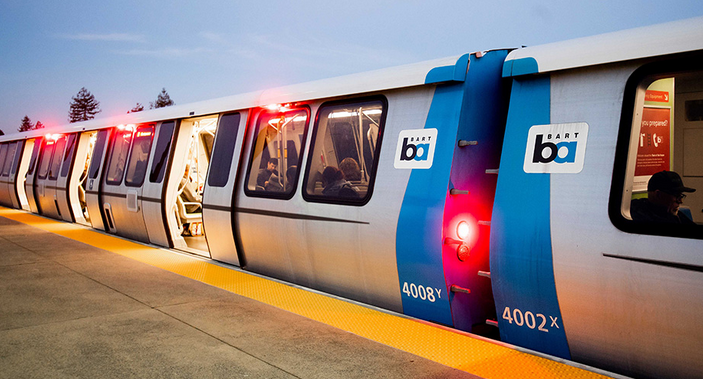 Rain didn't exactly make the 10 percent service frequency reduction more pleasant. Photos: Michael Rhodes
Rain didn't exactly make the 10 percent service frequency reduction more pleasant. Photos: Michael RhodesToday is the first workday test of the Muni system after a ten percent overall reduction in service frequency went into effect on Saturday. The scene on this rainy Monday didn't look all that different from a typical Muni commute: the buses were crowded and the waits were occasionally longer than they should be, but for the most part, people made it to their destination -- if not on time.
Complicating matters, Muni had a problem with its Automatic Train Control System (ATCS) that disrupted service on the J-Church and N-Judah for part of the morning, mixing up service cut confusion with run-of-the-mill mishap.
Aside from that, many of the riders Streetsblog spoke with this morning said they hadn't noticed a big change. But when Julia Brashares, who was waiting for the 33-Stanyan at 18th and Castro, started thinking about it, the extra-long wait for the bus this morning started to seem like it could be related to the service cuts.
She normally waits about seven to twelve minutes for the 33, and feels she has pretty good luck catching Muni in a reasonable amount of time. But today, she arrived to find a NextBus prediction of 22 minutes. With an appointment to make before she headed to work, the extra wait was especially a drag.
It might be something she'll have to get used to. The revised service schedule calls for the 33 to operate at 20 minute frequencies in the morning, versus 15 minutes before the service changes.
On the other hand, Brashares said she already bikes for about half her trips, and the recent service cuts just might prompt her to do so even more. The rain today made that a less attractive option, but she said the trip certainly would have been faster by bike. Even with the service cuts, driving more isn't in the cards for Brashares, who doesn't own a car, but occasionally uses City CarShare.
She's planning to follow the San Francisco Municipal Transportation Agency budget process more closely now. "I think it's a quality of life issue," she said, lamenting the transit cuts.
 One Muni Metro rider said she felt "somewhat protected" from the cuts since she mostly rides Muni trains, not buses.
One Muni Metro rider said she felt "somewhat protected" from the cuts since she mostly rides Muni trains, not buses.Traveling inbound on the L-Taraval, Debbie W. said she'd heard about the service cuts, but wasn't sure how they'd affect her most-traveled lines, the K, L, and M. Since she mostly rides the Muni Metro system, boarding at West Portal station, she feels "somewhat protected" from the cuts, which she hasn't noticed yet.
But she does occasionally take bus lines near West Portal, so the service frequency reduction might mean more driving for her. As for her commute to work in the Tenderloin, she's not ready to pay for parking in a garage every day, and says Muni would have to cut service a lot further -- "perhaps if it were one train an hour" -- before she'd ditch public transit.
Heading the other way through the Twin Peaks tunnel, a Muni operator who hadn't yet started his shift today said he's been watching the service changes this morning, and observed them while riding the N-Judah to a friend's house this weekend. Compared to typical conditions, he called the trains "not too crowded."
"It doesn't feel different," he said, preparing to start the 11 a.m. to 8 p.m. "twilight" shift. He's been on the job for 23 years, and said service has gradually improved in his time at Muni.
"It's getting better through the years, and more reliable," he said.
In general, the train lines weren't as severely impacted as some of the lower-frequency bus lines, some of which saw headways get longer by ten minutes or more in the new service schedule. The SFMTA adopted the service cuts to help cover a mid-year budget deficit, and recently voted to extend them into the next fiscal year, a decision that still need to be approved or rejected by the Board of Supervisors.
In the Twitter sphere, dozens of Muni riders posted their frustration with the delays this morning, mostly due to the J-Church and N-Judah train issues. "Shockingly the #muni is broken again. #surprise #imgettingabike," tweeted one.
 Some Muni riders are contemplating riding their bike for more trips in light of the service cuts.
Some Muni riders are contemplating riding their bike for more trips in light of the service cuts.Out on Stockton Street, where 30-Stockton and 45-Union/Stockton buses are actually scheduled to run at the same frequency as before -- they'll turn around and head back to Stockton when they get to less heavily used portions of the line -- the midday rush looked as packed as ever, but nothing out of the ordinary.
Of course, a lot of Muni riders may still be realizing that the slightly longer wait today was part of the service cuts, not just a usual hiccup in the system. SFMTA spokesperson Kristen Holland said she's get back with Muni's own
evaluation of the first weekday after the cuts later today.
If you rode on a Muni bus or train today, did you wait longer than usual or find it more crowded? Did you decide to simply take your bike (or car) instead, despite the rain? Let us know in the comments sections below how the first full day of service cuts are treating you. Be sure to check in after the evening commute as well!





